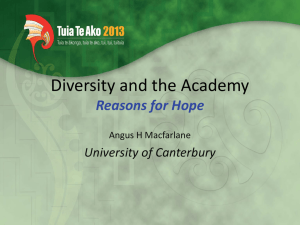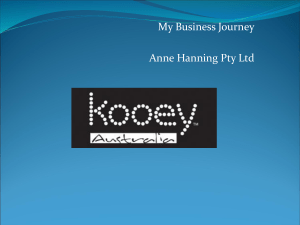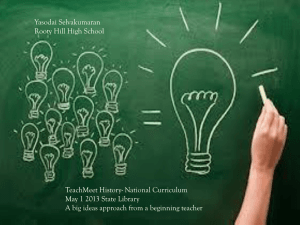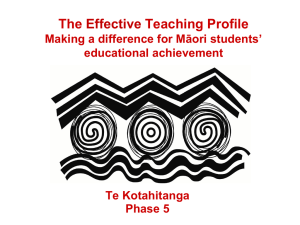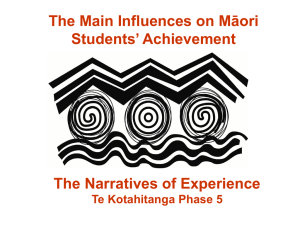Zuckermann_Reunion_5_11_14
advertisement
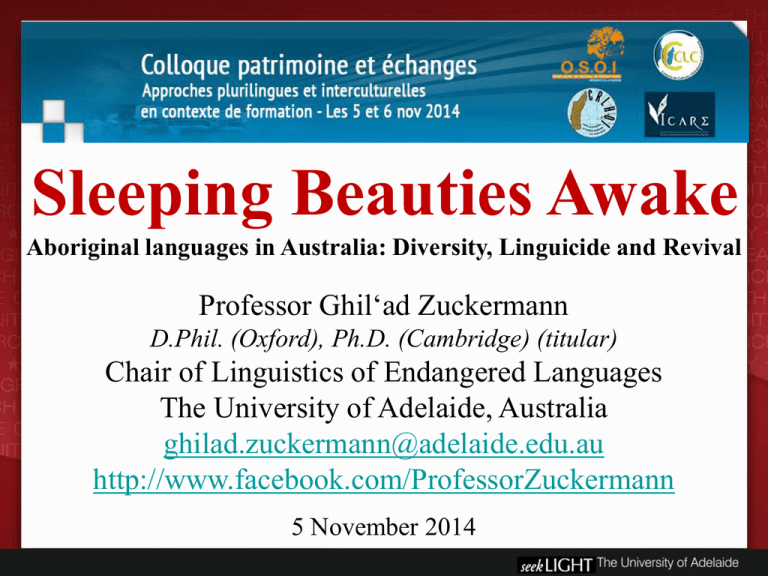
Sleeping Beauties Awake Aboriginal languages in Australia: Diversity, Linguicide and Revival Professor Ghil‘ad Zuckermann D.Phil. (Oxford), Ph.D. (Cambridge) (titular) Chair of Linguistics of Endangered Languages The University of Adelaide, Australia ghilad.zuckermann@adelaide.edu.au http://www.facebook.com/ProfessorZuckermann 5 November 2014 Outline of Today’s Lecture Main Question: WHY on earth should we invest time and money in reviving dead languages? (Ethical, aesthetic and utilitarian reasons) University of Adelaide 2 Outline of Today’s Lecture RELATED QUESTIONS: •Should we financially compensate Aboriginal people for the loss of their native tongues? •Should Aboriginal languages be defined as official languages of Australia? •Should we erect bilingual signs in Australia? •Is there a link between language and mental health? •Does language dictate the way we think? •Is it possible at all to reclaim a dead language? University of Adelaide 3 INTRODUCTION Gabmididi Barngarlidi Manoo ‘Learning and Speaking Barngarla Together’ Port Lincoln, South Australia, Professor Ghil‘ad Zuckermann with participants in the first Barngarla reclamation workshop, 18-20 April 2012 L-R: GZ, Barngarla man Stephen Atkinson, Barngarla Stolen woman Patricia Dare, Revd Volker Daly (director of the Leipzig Lutheran Mission – cf. Clamor Wilhelm Schürmann’s Barngarla Dictionary, 1844), Barngarla Stolen woman Maureen Atkinson (née Dare), Port Augusta, South Australia, 2013 Port Augusta 2013 Whyalla 2013 Gabmididi Barngarlidi Manoo ‘Learning and Speaking Barngarla Together’ Port Lincoln, South Australia, Professor Ghil‘ad Zuckermann with several participants in the first Barngarla reclamation workshop, 1820 April 2012 Whyalla, South Australia, Professor Ghil‘ad Zuckermann with several participants in one of the Barngarla Aboriginal language reclamation workshops The first Barngarla delegation to AIATSIS, Canberra (2013), with Dr Luise Hercus and Professor Ghil‘ad Zuckermann (13 February 2013): Vera Richards (Port Lincoln), Elizabeth Saunders (Port Lincoln), Sheldon Richards (Port Lincoln), Jayden Richards (Port Lincoln), Dawn Taylor (Whyalla), Dawneen Saunders (Whyalla), Jeanita Taylor (Whyalla), Malika Carter (Whyalla), Linda Dare (Port Augusta), Steve Atkinson (Port Augusta), Robert Wilton (Port Augusta). I must study Politicks and War that my sons may have liberty to study Mathematicks and Philosophy. My sons ought to study Mathematicks and Philosophy, Geography, natural History, Naval Architecture, navigation, Commerce and Agriculture, in order to give their Children a right to study Painting, Poetry, Musick, Architecture, Statuary, Tapestry and Porcelaine. John Adams (second President of the United States in 1797–1801) to Abigail Adams [post 12 May 1780] Adams Family Correspondence, 3:342 Basic Human Needs Based on Abraham Maslow's 1943 hierarchy of needs in his seminal article ‘A Theory of Human Motivation’ (Psychological Review 50.4: 370–96) LANGUAGE REVIVAL WHY on earth should we invest time/money in reviving/empowering languages? E.g. Why should we reclaim dead / extinct / hibernating / sleeping beauties / no-longer-spoken languages? A. Ethical, deontological reasons B. Aesthetic motivations C. Utilitarian and economic benefits Ethical Reasons Historical, humanistic and social justice If you talk to a man in a language he understands, that goes to his head. If you talk to him in his language, that goes to his heart. (Nelson Mandela) Ethical reasons Native Tongue Title: Deontological compensation for language loss: • The loss of language is more severe than the loss of land • Language death = loss of cultural autonomy • Language death = loss of spiritual and intellectual sovereignty • Language death = loss of soul • Language is a repository of ideas, values and experience Russell Hoban (children’s writer, 1925-2011 – cf. Haffenden 1985: 138): Language is an archaeological vehicle, full of the remnants of dead and living pasts, lost and buried civilizations and technologies. The language we speak is a whole palimpsest of human effort and history. ‘The native would be sooner civilised if their language was extinct.’ Report on a public meeting of the South Australian Missionary Society in aid of the German Mission to the Aborigines, Southern Australian 8 September 1843 p. 2 Anthony Forster (1813-1897) colonist, financier and politician ‘Mr Forster afterwards adverted to the present mode of teaching the children in their own language. He, with all respect to the Missionaries, would say, on several grounds, that this was wrong. The natives would be sooner civilized if their language was extinct. The children taught would afterwards mix only with whites, where their own language would be of no use – the use of their language would preserve their prejudices and debasement, and their language was not sufficient to express the ideas of civilized life. He gave the Missionaries full credit for their talents and zeal, but he thought it would be better to teach the children in English.’ (Report on a public meeting of the South Australian Missionary Society in aid of the German Mission to the Aborigines, Southern Australian, 8 September 1843, p. 2, cf. Scrimgeour 2007: 116) ‘The merchant in London who lays on a vessel for a certain port, regards the affair as a mere mercantile speculation, but could he trace out the results he effects in their remotest ramifications, he would stand astonished at the changes he produces. With the wizard wand of commerce, he touches a lone and trackless forest, and at his bidding, cities arise, and the hum and dust of trade collect – away are swept ancient races; antique laws and customs moulder into oblivion. The strong-holds of murder and superstition are cleansed, and the Gospel is preached amongst ignorant and savage men. The ruder languages disappear successively, and the tongue of England alone is heard around.’ George Grey 1841 Journals of Two Expeditions of Discovery, Vol 2, pp. 200-201 South Australian Governor George Grey Ethical reasons (Native Tongue Title: Deontological compensation for language loss:) • In case of linguicide (language killing) or glottophagy (language eating): It is much harder to prove continuity in Native Title cases Protection of Intellectual Property (IP): Traditional Indigenous knowledge: language, stories, music, dance, symbols, art, crafts, cosmology, medicinal and environmental knowledge etc. See Mātauranga Māori in New Zealand Cf. Conversations on Mātauranga Māori, edited by Professor Tai(arahia) Black Ethical reasons (Native Tongue Title: Deontological compensation for language loss:) Australia ought to learn from New Zealand. Aboriginal and Torres Strait Islander vernaculars should be defined as official languages of their state/territory/land. Signs (Linguistic Landscape) should be both in English and in the local Indigenous language. Australia ought to learn from New Zealand Māori Native Tongue Title: WAI 11 & WAI 262 There are two particularly important claims by Māori relating to te reo Māori (the Māori Language). These are WAI 11 and WAI 262 claims to the Waitangi Tribunal (set up in 1975 to hear claims relating to Crown violations of the Treaty of Waitangi). WAI 11 (Year: 1985) Claimants: Huirangi Waikerepuru and Nga Kaiwhakapumau i te Reo. Claim: that the Crown had failed to protect the language (a taonga/ treasure) as required by article 2 of the Treaty of Waitangi. (Article 2 guarantees to Māori the right to keep their lands, forests, fisheries and all their treasures (taonga). It was noted that: Ka ngaro te reo, ka ngaro tāua, pērā i te ngaro o te moa (If the language be lost, man will be lost, as dead as the moa.) WAI 11 (1985) WAI 11 (1985) (cont.) The tribunal found in favour of the claimants: When the question for decision is whether te reo Māori is a ‘taonga’ which the Crown is obliged to recognise we conclude that there can be only one answer. It is plain that the language is an essential part of the culture and must be regarded as ‘a valued possession’. Recommendations in summary: legislation enabling use of te reo Māori in the courts by anyone who wishes to do so; establishment of a body to supervise and foster the use of te reo Māori; ensure all children who wish to learn Māori can do so with financial support from the State; develop broadcasting policy that acts on the Crown’s obligation to recognize and protect the language; bilingualism as a prerequisite for any positions of employment with the State services Commission. WAI 262 (1991) WAI 262 (Year: 1991) Claimants: Haana Murray (Ngāti Kurī), Hema Nui a Tawhaki Witana (Te Rarawa), Te Witi McMath (Ngāti Wai), Tama Poata (Ngāti Porou), Kataraina Rimene (Ngāti Kahungunu), and John Hippolite (Ngāti Koata) – on behalf of themselves and their iwi Claim: relates to the place of Māori culture, identity and traditional knowledge in New Zealand’s laws, and in government policies and practices. Tribunal findings include: establishment of new partnership bodies in education, conservation, and culture and heritage; a new commission to protect Māori cultural works against derogatory or offensive uses and unauthorised commercial uses; a new funding agent for mātauranga Māori in science; expanded roles for some existing bodies including Te Taura Whiri (the Māori Language Commission), the newly established national rongoā body Te Paepae Matua mō te Rongoā, and Māori advisory bodies relating to patents and environmental protection. WAI 262 (1991) WAI 262 (1991) (cont.) Findings relating to the language: The Crown’s support for revival of the language should include (1) effective policies, appropriate resourcing, and steps towards the provision of public services in te reo as well as English; (2) the provision of programmes – including Māori-medium education – that are highly focused and effective, and appropriately resourced; (3) an expanded role and powers for Te Taura Whiri (Māori Language Commission), including powers to require public sector agencies to produce Māori language plans (in consultation with iwi), and to approve those plans, and powers to set targets for training of te reo teachers, approve education curricula for te reo, and otherwise hold public sector agencies accountable for their responsibilities towards the language. The Australian Aboriginal flag, designed by Harold Thomas; first flown on 12 July 1971 at Victoria Square, Adelaide. (German influence?) Lads/Lasses Langue Land My proposed flag for a Language Day reflecting the People-Land-Language trinity LINGUICIDE VS WELLBEING: Lads/Lasses The Revival of the Barngarla Aboriginal Language of Eyre Peninsula, South Australia: Andy Park interviews the Barngarla community of Port Augusta. Land (SBS, 5 minutes) http://www.youtube.com/watch?v=DZPjdNaLCho Whyalla 2013 WHY should we invest time/money in reviving/empowering languages? Aesthetic Motivations Aesthetic Motivations When you lose a language, you lose a culture, intellectual wealth, a work of art. It’s like dropping a bomb on a museum, the Louvre. (Ken Hale, The Economist, 3 November 2001) Diversity Rich, Colourful Australia, Lucky Country Monolingual Mindset Australia This is what we do not want: Homo sapiens sapiens (the human who knows s/he knows) The most complex Chinese character I have ever encountered, pronounced biáng, referring to a specific kind of noodles; Xi'an, China, 12 May 2012 Diversity – Kuuk Thaayorre: Boroditsky and Gaby (2010) Linguistic Built-in Compass (rather than GPS) Adelaide Zoo (9 April 2012) Adelaide Zoo (9 April 2012) The survival of the Tasmanian Devil is important! What about the survival of the Palawa languages of Tasmania? Cleland 8 April 2012 And we exist to save languages and cultures from extinction With orphan joeys, Little-hampton, South Australia, 2 June 2012 (WHY should we invest time and money in reviving languages?) Diversity: Endangered grammatical ways to express familiar concepts Mamihlapinatapai Language: Yaghan (Tierra del Fuego, Chile & Argentina) Meaning: A look shared by two people, each wishing that the other will offer something that they both desire but have been unwilling to suggest or offer themselves. Morphemic Analysis • ma, a reflexive/passive prefix. – allomorph (before a vowel): mam• ihlapi [iɬapi] ‘to be at a loss as what to do next’, – root (lexical morpheme) • -n, stative suffix • -ata, achievement suffix • -apai, a dual suffix, which in composition with ma- has a reciprocal sense (cf. circumfix) Coffee http://www.youtube.com/w atch?v=mRAGb-6wAvk Diversity: Endangered concepts Nakhur Language: Persian Meaning: A camel that will not give milk until her nostrils have been tickled. Diversity: Endangered concepts Tingo Language: Rapa Nui (Pasquan), Eastern Polynesian language spoken on Rapa Nui (Easter Island) Meaning: To take all the objects one desires from the house of a friend, one at a time, by asking to borrow them, until there is nothing left. (de Boinod 2005) WHY should we invest time/money in reviving/empowering languages? Utilitarian Benefits Utilitarian Benefits Personal, mental, spiritual and physical well-being sense of pride and self-esteem antidote for self-loathing – Email from Jenna, 3 May 2012, 16:22: Personally, I found the experience of learning our language liberating and went home feeling very overwhelmed because we were finally going to learn our "own" language, it gave me a sense of identity and I think if the whole family learnt our language then we would all feel totally different about ourselves and each other cause it's almost like it gives you a purpose in life. Utilitarian benefits Facebook comment from Evelyn, 21 April 2012, 14:16: A big thank you on behalf of our family here in Port Lincoln, our ancestors are happy ‘Language is power; let us have ours!’ Aboriginal politician Aden Ridgeway 26 November 2009 Sydney Morning Herald Port Lincoln, 2013 NILS 2 (2014): Goals of language activities Data drawn from the Second National Indigenous Languages Survey (NILS 2) Report, analysed by Marmion, Kazuko, & Troy (2014) Utilitarian benefits – (for bean-counters): Saving governmental money associated with ill health and social dysfunction ILS support: $50,000 per language per annum (2010-11) ($9,400,000 given to 78 projects involving 200 languages) Incarceration: $100,000 per person per annum (2009) Mental health (adolescent): $1,395 per patient per diem Utilitarian benefits Improving mental health • National Survey of Mental Wellbeing (Australia): 20% of Australians suffer from a chronic mental illness and experienced any mental disorder in the last 12 months (depression, anxiety disorders etc.) 40% of Australians suffer from any mental disorder in their life. • 2008 National Aboriginal and Torres Strait Islander (ATSI) Social Survey (Australian Bureau of Statistics (ABS) Publication 4704.0): 31% of ATSI aged 15+ experience high or very high levels of psychological distress in the 4 weeks prior to interview! This is 2.5 times the rate for non-Indigenous Australians! Utilitarian benefits Improving mental health Darcy Hallett, Michael J. Chandler and Christopher E. Lalonde (2007). ‘Aboriginal language knowledge and youth suicide’, Cognitive Development 22: 392-399: In British Columbia, Canada, there is a clear correlation between youth suicide and lack of conversational knowledge in the native language. Utilitarian benefits Educational empowerment: Aboriginal people involved in language reclamation acquire academic self-confidence improving their accomplishments in other, non-linguistic, subjects. Employability: Obtaining jobs based on acquired literacy, numeracy and computer skills; translation, interpreting, teaching, literature Closing the gap Cultural tourism Code talking (secret languages used for security purposes (cf. Navajo in World War II) Utilitarian benefits Cognitive advantages of bilingualism: – Kovacs and Mehler (2009) – ‘The bilingual’s enhanced experience with sound results in an auditory system that is highly efficient, flexible and focused in its automatic sound processing, especially in challenging or novel listening conditions’ (Nina Kraus, 2012) Medical advantages of bilingualism: anti-dementia Utilitarian benefits Cognitive advantages of non-native bilingualism: Using a foreign language reduces decision-making biases! Four experiments show that the ‘framing effect’ disappears when choices are presented in a foreign tongue. Whereas people were risk averse for gains and risk seeking for losses when choices were presented in their native tongue, they were not influenced by this framing manipulation in a foreign language. Two additional experiments show that using a foreign language reduces loss aversion, increasing the acceptance of both hypothetical and real bets with positive expected value. We propose that these effects arise because a foreign language provides greater cognitive and emotional distance than a native tongue does. (Boaz Keysar, Sayuri L. Hayakawa and Sun Gyu An, 2012, Psychological Science) Utilitarian benefits (for groundbreakers): Potential contribution to future scientific breakthroughs (unknown unknowns): Cf. mathematics arising from languages with a counting system Cf. medical discoveries based on rainforest plants that would have been extinct without sustainability and environmental conservation Identity Economics (George A. Akerlof and Rachel E. Kranton 2011): linking identities and everyday decisions Utilitarian benefits • Intellectual Property (Generation II): Establishing Revivalistics (Revival Linguistics) will turn First Nations Australians into the world’s experts of language revival In the future the very insights offered by Revivalistics will themselves become part of Aboriginal Intellectual Property! Slovenes, Estonians etc. will come to Australia to ask Indigenous Australians to assist them in their own European language resurrection Strine Signs Strine Signs Summary (1) If your language is endangered Do not allow it to fall asleep! (2) If your language falls asleep (3) If you revive a language Embrace the hybridity of the children’s emerging tongue! (4) If your language is healthy Consider helping others in linguistic need! Final Video Clip Lads/Lasses IDEOLOGY AND HYBRIDITY: The Hebrew Revival: British actor Stephen Fry interviewing Prof. Ghil‘ad Zuckermann Land (BBC, 7.5 minutes) http://vimeo.com/channels/357807/44019045 Professor Ghil‘ad Zuckermann, D.Phil. (Oxford), Ph.D. (Cambridge) (titular) Chair of Linguistics of Endangered Languages School of Humanities, The University of Adelaide http://www.adelaide.edu.au/directory/ghilad.zuckermann http://www.facebook.com/ProfessorZuckermann ghilad.zuckermann@adelaide.edu.au


